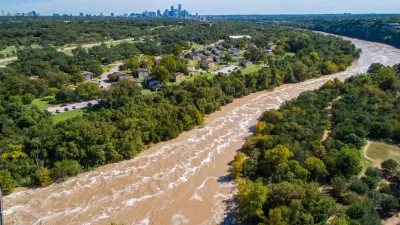Miami is in a race against time to build defenses against climate change and rising sea levels—resilience projects that require property tax revenue generated from luxury developments built in the areas most at risk.
Danielle Paquette reports on the Catch-22 of Miami development, especially in the area that "scientists call one of America’s most vulnerable floodplains."
"The more developers build here, the more taxes and fees the city collects to fund a $300-million storm water project to defend the shore against the rising sea," writes Paquette.
Critics of development approvals in the floodplain question the common sense of allowing more development in neighborhoods already over-burdening their infrastructure.
Paquette goes on to detail the details of the $300 million project, which the city is implementing by borrowing against a "new stormwater utility fee on homeowners, hotels and stores." Finally, Paquette also provides more detail and anecdotes from the real estate market in Miami, especially along the receding coast.
FULL STORY: Miami’s climate catch-22: Building waterfront condos to pay for protection against the rising sea

Planetizen Federal Action Tracker
A weekly monitor of how Trump’s orders and actions are impacting planners and planning in America.

San Francisco's School District Spent $105M To Build Affordable Housing for Teachers — And That's Just the Beginning
SFUSD joins a growing list of school districts using their land holdings to address housing affordability challenges faced by their own employees.

The Tiny, Adorable $7,000 Car Turning Japan Onto EVs
The single seat Mibot charges from a regular plug as quickly as an iPad, and is about half the price of an average EV.

Seattle's Plan for Adopting Driverless Cars
Equity, safety, accessibility and affordability are front of mind as the city prepares for robotaxis and other autonomous vehicles.

As Trump Phases Out FEMA, Is It Time to Flee the Floodplains?
With less federal funding available for disaster relief efforts, the need to relocate at-risk communities is more urgent than ever.

With Protected Lanes, 460% More People Commute by Bike
For those needing more ammo, more data proving what we already knew is here.
Urban Design for Planners 1: Software Tools
This six-course series explores essential urban design concepts using open source software and equips planners with the tools they need to participate fully in the urban design process.
Planning for Universal Design
Learn the tools for implementing Universal Design in planning regulations.
Smith Gee Studio
City of Charlotte
City of Camden Redevelopment Agency
City of Astoria
Transportation Research & Education Center (TREC) at Portland State University
US High Speed Rail Association
City of Camden Redevelopment Agency
Municipality of Princeton (NJ)





























